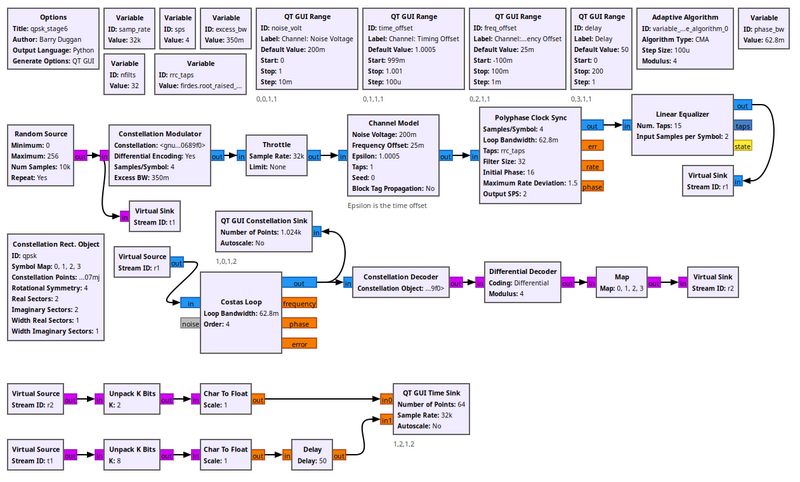Unpack K Bits: Difference between revisions
Jump to navigation
Jump to search
| (2 intermediate revisions by one other user not shown) | |||
| Line 20: | Line 20: | ||
== Example Flowgraph == | == Example Flowgraph == | ||
[[File:Qpsk_stage6_fg.png|800px|]] | |||
== Source Files == | |||
; C++ files | |||
: [https://github.com/gnuradio/gnuradio/blob/main/gr-blocks/lib/unpack_k_bits_bb_impl.cc Byte implementation] | |||
: [https://github.com/gnuradio/gnuradio/blob/main/gr-blocks/lib/unpack_k_bits.cc Base class] | |||
; Header files | |||
: [https://github.com/gnuradio/gnuradio/blob/main/gr-blocks/lib/unpack_k_bits_bb_impl.h] | |||
; Public header files | |||
: [https://github.com/gnuradio/gnuradio/blob/main/gr-blocks/include/gnuradio/blocks/unpack_k_bits_bb.h Byte implementation] | |||
: [https://github.com/gnuradio/gnuradio/blob/main/gr-blocks/include/gnuradio/blocks/unpack_k_bits.h Base class] | |||
; Block definition | |||
: [https://github.com/gnuradio/gnuradio/blob/main/gr-blocks/grc/blocks_unpack_k_bits_bb.block.yml] | |||
Latest revision as of 14:40, 9 December 2023
Opposite of Pack K Bits - Converts a byte with k relevant bits to k output bytes with 1 bit each, located in the LSB.
In other words, this block picks the K least significant bits from a byte, and expands them into K bytes of 0 or 1.
Example:
k = 4
in = [0xf5, 0x08]
out = [0,1,0,1,1,0,0,0]
Each input byte produced four output bytes (that are either 0 or 1). Remember that there is no item type of "bit" in GNU Radio, so we have to use bytes to represent single bits.
Parameters
- K
- Constant for unpacking bits
Example Flowgraph
Source Files
- C++ files
- Byte implementation
- Base class
- Header files
- [1]
- Public header files
- Byte implementation
- Base class
- Block definition
- [2]
